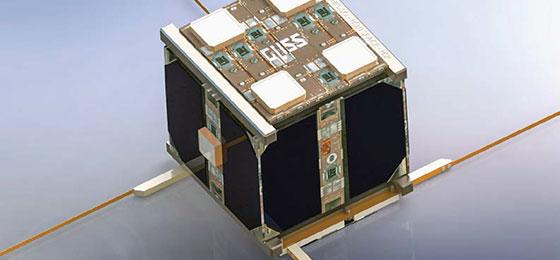Low-cost space flight

Nanosatellites weigh just over a kilogram, don't cost more than a family car, and are destined to democratise access to space. Researchers and manufacturers from Switzerland are involved. By Roland Fischer
(From "Horizons" no. 112 March 2017)
The space flight scene is in a state of upheaval. Something along the lines of a democratisation of space is happening – at least as far as the lower orbits are concerned. For several years, numerous universities have been experimenting with so-called nanosatellites. In the coming years, they will probably experience a commercial breakthrough – and Switzerland is playing an important role in it.
For example, there are young entrepreneurs such as the Astrocast team from Lausanne who want to use nanosatellites to create a global data network for the Internet of Things. With a planned minimum bandwidth of one kilobyte per day, the technology is correspondingly cheap. Initial commercial deals have been agreed, and they are presently looking for a partner who can offer low-cost transport. In fact, constructing small satellites is now such a routine matter that it's more expensive to put a satellite into orbit than to make it.
'Low cost' – that's the magic word in this 'new space movement'. "Until now, space missions were the preserve of the big state agencies", says Markus Rothacher, a professor of mathematics and physical geodesy at ETH Zurich. "But today, every university is in a position to produce its own satellites, as are the smaller companies".
Independent GPS
The EPFL spin-off company Astrocast is basing what it does on the expertise gained from the Swisscube, which was the first and so far the only small satellite to have been launched by a Swiss university, back in 2009. A successor satellite should have long been sent up, but the CubETH project of ETH Zurich and EPFL isn't quite getting off the ground. They planned building a four-inch cube with which to be able to test a simple global navigation satellite system independent of the American GPS. It's not a receiver designed especially for space, but is made using off-the-rack technology. The researchers at ETH Zurich are currently examining whether the GNSS chips mass-produced by the Thalwil company U-Blox are suitable for the inhospitable conditions of space. They have already survived the vacuum chamber of Ruag Space without incurring any damage, and they are currently undergoing radiation tests at the Paul Scherrer Institute.
The technology of CubETH is of central interest to the Astrocast mission, and the chip will be tested in 2017 on one of the first flights of the Lausanne spin-off. Astrocast will send a total of 64 small satellites into low orbit in the coming years in order to achieve unbroken coverage of the whole Earth's surface. "The primary goal is to win over commercial operators such as transport companies and the manufacturers of measurement systems", says CEO Fabien Jordan. But he hopes that researchers from a multitude of disciplines, from meteorology to biology, will be among those using his infrastructure. For example, researchers might want to collect extensive data automatically from deserts or icy regions. With further sensors, many other applications can be opened up, such as tsunami warning systems.
Internet from space
Michael Swartwout from the University St. Louis is documenting the development of nanosatellites in an online database. He doesn't see any sign of an imminent drop in the rapid growth that began in 2014. "No slowdown in sight, not at all", he says. People estimate that by the year 2020 there will be thousands of small satellites in orbit, most of them for telecommunications. By that same year, the company Oneweb wants to have a constellation of 648 satellites in orbit so as to provide Internet access all over the Earth. Elon Musk, the founder of Tesla, is pursuing a similar goal. In November, Oneweb announced who is going to make their satellites: Ruag in Switzerland. It's a prestigious deal, though hardly one to bring in billions – after all, it's 'low cost'. In Switzerland, the 600-plus satellites will be built for just CHF 20 million. That's CHF 33,000 each: the price of a medium-sized car.
Roland Fischer is a freelance science journalist in Bern.